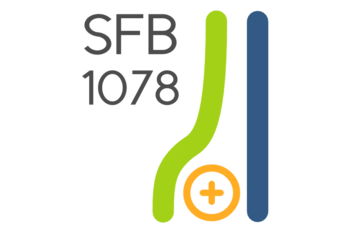CRC 1078: Protonation Dynamics in Protein Function (2013 - 2024)
What role does the movement of hydrogen ions (protons) play in the function of proteins?
The SFB 1078 has set itself the goal of introducing a new mechanistic principle into the understanding of the mechanisms of action of proteins: the control and coordination of complex protein function through protonation dynamics.
The proton movements in the functionally important networks of hydrogen bonds occur on different time and length scales. This ranges from femtoseconds to seconds and from less than 0.1 nanometers to more than 10 nanometers. To better understand the processes, experiments were combined with theory and simulations.
Key Model Protein Systems
Different parts of the protonation dynamics were investigated on two proteins that are important for biological energy conversion: Oxygen reduction, which is coupled to proton pumping by cytochrome c oxidase, and water oxidation, which is catalyzed by photosystem II. It has been found that major structural changes can slow down or even prevent electron transfer in proteins. Light-induced conformational changes play a crucial role in the mechanism of phytochromes, channelrhodopsins and pH-controlled proton channels. The functionality of the latter was compared with that of the pH-controlled viroporins. These changes are often associated with or driven by proton movements.
Development of New Methods for Membrane Bound Proteins
A key aspect of research in the SFB 1078 was the development and adaptation of various experimental and theoretical methods to the requirements of the specific protein systems. These included the incorporation of non-canonical amino acids into proteins, time-resolved serial femtosecond X-ray crystallography, nuclear magnetic resonance spectroscopy at high magnetic fields, time-resolved electronic and vibrational spectroscopy over a large dynamic range, and multiscale modeling approaches from quantum mechanics, molecular dynamics simulation and their hybrids. The application of such advanced techniques to the SFB's proteins was challenging as most of them are integral membrane proteins.
The CRC 1078 achieved its original goal of comprehensively understanding protonation dynamics as an important element of the functional mechanisms of five selected protein families and thus to understand this process as a generic principle of protein function.
Spokesperson
Professor Dr. Holger Dau (2013 - 2017)
Professor Dr. Joachim Heberle (2017 - 2024)
Involved research groups
Alexiev, Clementi, Dau, Heberle, Heyne, Kozuch, Netz, Schlesinger as well as Block, Imhof, Bondar
Key figures
- € 29.9 m of public funding
- more than 430 publications
- 8 professorial appointments
- 72 doctorates completed
Participating institutions
- Freie Universität Berlin
- Technical University of Berlin
- Technical University of Dresden
- Humboldt University of Berlin
- Charité – Universitätsmedizin Berlin
- Leibniz Institute for Molecular Pharmacology
- Justus Liebig University Giessen
- Hebrew University of Jerusalem in Israel
